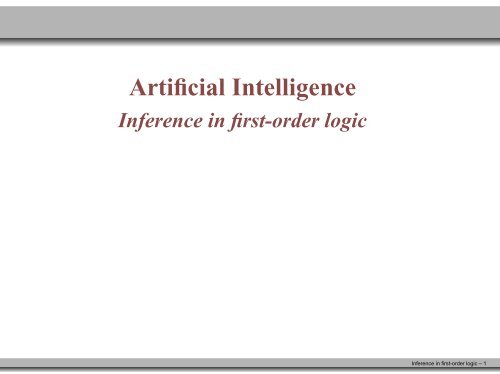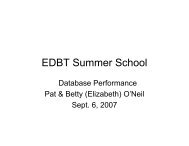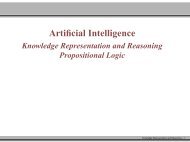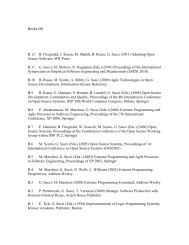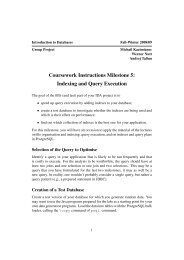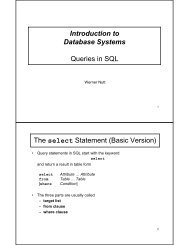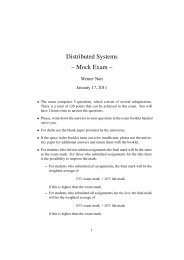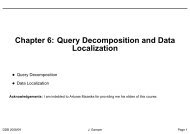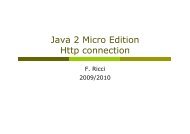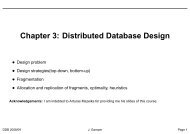Inference in first-order logic
Inference in first-order logic
Inference in first-order logic
Create successful ePaper yourself
Turn your PDF publications into a flip-book with our unique Google optimized e-Paper software.
Artificial Intelligence<br />
<strong>Inference</strong> <strong>in</strong> <strong>first</strong>-<strong>order</strong> <strong>logic</strong><br />
<strong>Inference</strong> <strong>in</strong> <strong>first</strong>-<strong>order</strong> <strong>logic</strong> – 1
Outl<strong>in</strong>e<br />
♦ Reduc<strong>in</strong>g <strong>first</strong>-<strong>order</strong> <strong>in</strong>ference to propositional <strong>in</strong>ference<br />
♦ Unification<br />
♦ Generalized Modus Ponens<br />
♦ Forward and backward cha<strong>in</strong><strong>in</strong>g<br />
♦ Resolution<br />
<strong>Inference</strong> <strong>in</strong> <strong>first</strong>-<strong>order</strong> <strong>logic</strong> – 2
Universal <strong>in</strong>stantiation (UI)<br />
Every <strong>in</strong>stantiation of a universally quantified sentence is entailed<br />
by it:<br />
∀v α<br />
SUBST({v/g},α)<br />
for any variable v and ground term g<br />
E.g., ∀x K<strong>in</strong>g(x) ∧ Greedy(x) → Evil(x) yields<br />
K<strong>in</strong>g(John) ∧ Greedy(John) → Evil(John)<br />
K<strong>in</strong>g(Richard) ∧ Greedy(Richard) → Evil(Richard)<br />
K<strong>in</strong>g(Father(John)) ∧ Greedy(Father(John))<br />
→ Evil(Father(John))<br />
.<br />
<strong>Inference</strong> <strong>in</strong> <strong>first</strong>-<strong>order</strong> <strong>logic</strong> – 3
Existential <strong>in</strong>stantiation (EI)<br />
For any sentence α, variable v, and constant symbol k not<br />
appear<strong>in</strong>g <strong>in</strong> the knowledge base:<br />
k is called a Skolem constant<br />
∃v α<br />
SUBST({v/k},α)<br />
♦ E.g., ∃x Crown(x) ∧ OnHead(x,John) yields<br />
Crown(C 1 ) ∧ OnHead(C 1 ,John)<br />
provided C 1 is a new constant symbol<br />
♦ from ∃x d(x y )/dy =x y we obta<strong>in</strong><br />
d(e y )/dy =e y<br />
provided e is a new constant symbol<br />
<strong>Inference</strong> <strong>in</strong> <strong>first</strong>-<strong>order</strong> <strong>logic</strong> – 4
Existential <strong>in</strong>stantiation contd.<br />
♦ UI can be applied several times to add new sentences;<br />
♦ the new KB is <strong>logic</strong>ally equivalent to the old<br />
♦ EI can be applied once to replace the existential sentence;<br />
♦ the new KB is not equivalent to the old,<br />
♦ but is satisfiable iff the old KB was satisfiable<br />
<strong>Inference</strong> <strong>in</strong> <strong>first</strong>-<strong>order</strong> <strong>logic</strong> – 5
Existential <strong>in</strong>stantiation contd.<br />
♦ UI can be applied several times to add new sentences;<br />
♦ the new KB is <strong>logic</strong>ally equivalent to the old<br />
♦ EI can be applied once to replace the existential sentence;<br />
♦ the new KB is not equivalent to the old,<br />
♦ but is satisfiable iff the old KB was satisfiable<br />
♦ trickier when ∃ <strong>in</strong> the scope of ∀<br />
♦ e.g. “Every person has a heart”<br />
∀x(Person(x) → ∃yHas(x,y) ∧ Heart(y))<br />
wrong: ∀x(Person(x) → Has(x,H 1 ) ∧ Heart(H 1 ))<br />
♦ we don’t share the same heart!<br />
<strong>Inference</strong> <strong>in</strong> <strong>first</strong>-<strong>order</strong> <strong>logic</strong> – 5
Propositionalization<br />
Suppose the KB conta<strong>in</strong>s just the follow<strong>in</strong>g:<br />
∀x K<strong>in</strong>g(x) ∧ Greedy(x) → Evil(x)<br />
K<strong>in</strong>g(John)<br />
Greedy(John)<br />
Brother(Richard,John)<br />
Instantiat<strong>in</strong>g the universal sentence <strong>in</strong> all possible ways, we have<br />
K<strong>in</strong>g(John) ∧ Greedy(John) → Evil(John)<br />
K<strong>in</strong>g(Richard) ∧ Greedy(Richard) → Evil(Richard)<br />
K<strong>in</strong>g(John)<br />
Greedy(John)<br />
Brother(Richard,John)<br />
<strong>Inference</strong> <strong>in</strong> <strong>first</strong>-<strong>order</strong> <strong>logic</strong> – 6
Propositionalization<br />
K<strong>in</strong>g(John) ∧ Greedy(John) → Evil(John)<br />
K<strong>in</strong>g(Richard) ∧ Greedy(Richard) → Evil(Richard)<br />
K<strong>in</strong>g(John)<br />
Greedy(John)<br />
Brother(Richard,John)<br />
The new KB is propositionalized: proposition symbols are<br />
K<strong>in</strong>g(John), Greedy(John), Evil(John),K<strong>in</strong>g(Richard) etc.<br />
<strong>Inference</strong> <strong>in</strong> <strong>first</strong>-<strong>order</strong> <strong>logic</strong> – 7
Problems with propositionalization<br />
♦ Propositionalization seems to generate lots of irrelevant<br />
sentences.<br />
E.g., from<br />
∀x K<strong>in</strong>g(x) ∧ Greedy(x) → Evil(x)<br />
K<strong>in</strong>g(John)<br />
∀y Greedy(y)<br />
Brother(Richard,John)<br />
♦ it seems obvious that Evil(John), but propositionalization<br />
produces lots of facts such as Greedy(Richard) that are<br />
irrelevant<br />
♦ With p k-ary predicates and n constants, there are p · n k<br />
<strong>in</strong>stantiations<br />
<strong>Inference</strong> <strong>in</strong> <strong>first</strong>-<strong>order</strong> <strong>logic</strong> – 8
Unification<br />
♦ looks for substitutions <strong>in</strong> a smarter way<br />
♦ e.g. θ = {x/John,y/John} makes K<strong>in</strong>g(x) and Greedy(x)<br />
match K<strong>in</strong>g(John) and ∀y Greedy(y)<br />
♦ <strong>in</strong> general: UNIFY(α,β) = θ if αθ =βθ<br />
α{x 1 /c 1 ,...,x n /c n } ≡ SUBST({x 1 /c 1 },α{x 2 /c 2 ,...,x n /c n })<br />
α β θ<br />
Knows(John, x) Knows(John, Jane)<br />
Knows(John, x) Knows(y, OJ)<br />
Knows(John, x) Knows(y, Mother(y))<br />
Knows(John, x) Knows(x, OJ)<br />
<strong>Inference</strong> <strong>in</strong> <strong>first</strong>-<strong>order</strong> <strong>logic</strong> – 9
Unification<br />
♦ looks for substitutions <strong>in</strong> a smarter way<br />
♦ e.g. θ = {x/John,y/John} makes K<strong>in</strong>g(x) and Greedy(x)<br />
match K<strong>in</strong>g(John) and ∀y Greedy(y)<br />
♦ <strong>in</strong> general: UNIFY(α,β) = θ if αθ =βθ<br />
α{x 1 /c 1 ,...,x n /c n } ≡ SUBST({x 1 /c 1 },α{x 2 /c 2 ,...,x n /c n })<br />
α β θ<br />
Knows(John, x) Knows(John, Jane) {x/Jane}<br />
Knows(John, x) Knows(y, OJ)<br />
Knows(John, x) Knows(y, Mother(y))<br />
Knows(John, x) Knows(x, OJ)<br />
<strong>Inference</strong> <strong>in</strong> <strong>first</strong>-<strong>order</strong> <strong>logic</strong> – 9
Unification<br />
♦ looks for substitutions <strong>in</strong> a smarter way<br />
♦ e.g. θ = {x/John,y/John} makes K<strong>in</strong>g(x) and Greedy(x)<br />
match K<strong>in</strong>g(John) and ∀y Greedy(y)<br />
♦ <strong>in</strong> general: UNIFY(α,β) = θ if αθ =βθ<br />
α{x 1 /c 1 ,...,x n /c n } ≡ SUBST({x 1 /c 1 },α{x 2 /c 2 ,...,x n /c n })<br />
α β θ<br />
Knows(John, x) Knows(John, Jane) {x/Jane}<br />
Knows(John, x) Knows(y, OJ) {x/OJ, y/John}<br />
Knows(John, x) Knows(y, Mother(y))<br />
Knows(John, x) Knows(x, OJ)<br />
<strong>Inference</strong> <strong>in</strong> <strong>first</strong>-<strong>order</strong> <strong>logic</strong> – 9
Unification<br />
♦ looks for substitutions <strong>in</strong> a smarter way<br />
♦ e.g. θ = {x/John,y/John} makes K<strong>in</strong>g(x) and Greedy(x)<br />
match K<strong>in</strong>g(John) and ∀y Greedy(y)<br />
♦ <strong>in</strong> general: UNIFY(α,β) = θ if αθ =βθ<br />
α{x 1 /c 1 ,...,x n /c n } ≡ SUBST({x 1 /c 1 },α{x 2 /c 2 ,...,x n /c n })<br />
α β θ<br />
Knows(John, x) Knows(John, Jane) {x/Jane}<br />
Knows(John, x) Knows(y, OJ) {x/OJ, y/John}<br />
Knows(John, x) Knows(y, Mother(y)) {y/John, x/Mother(John)}<br />
Knows(John, x) Knows(x, OJ)<br />
<strong>Inference</strong> <strong>in</strong> <strong>first</strong>-<strong>order</strong> <strong>logic</strong> – 9
Unification<br />
♦ looks for substitutions <strong>in</strong> a smarter way<br />
♦ e.g. θ = {x/John,y/John} makes K<strong>in</strong>g(x) and Greedy(x)<br />
match K<strong>in</strong>g(John) and ∀y Greedy(y)<br />
♦ <strong>in</strong> general: UNIFY(α,β) = θ if αθ =βθ<br />
α{x 1 /c 1 ,...,x n /c n } ≡ SUBST({x 1 /c 1 },α{x 2 /c 2 ,...,x n /c n })<br />
α β θ<br />
Knows(John, x) Knows(John, Jane) {x/Jane}<br />
Knows(John, x) Knows(y, OJ) {x/OJ, y/John}<br />
Knows(John, x) Knows(y, Mother(y)) {y/John, x/Mother(John)}<br />
Knows(John, x) Knows(x, OJ) fail<br />
♦ Standardiz<strong>in</strong>g apart elim<strong>in</strong>ates overlap of variables, e.g.,<br />
Knows(z 17 ,OJ)<br />
<strong>Inference</strong> <strong>in</strong> <strong>first</strong>-<strong>order</strong> <strong>logic</strong> – 9
Unification (contd.)<br />
♦ idea: Unify rule premises with known facts, apply unifier to<br />
conclusion<br />
♦ e.g. know<strong>in</strong>g β and assertion<br />
∀x Knows(John,x) → Likes(John,x) we can conclude<br />
♦ Likes(John,Jane)<br />
♦ Likes(John,OJ)<br />
♦ Likes(John,Mother(John))<br />
<strong>Inference</strong> <strong>in</strong> <strong>first</strong>-<strong>order</strong> <strong>logic</strong> – 10
Generalized Modus Ponens (GMP)<br />
p 1 ′ , p 2 ′ , ..., p n ′ , (p 1 ∧ p 2 ∧ ... ∧ p n → q)<br />
qθ<br />
where UNIFY(p i ′ ,p i ) =θ for all i<br />
p ′ 1 is K<strong>in</strong>g(John)<br />
p ′ 2 is Greedy(y)<br />
θ is {x/John,y/John}<br />
qθ is Evil(John)<br />
p 1 is K<strong>in</strong>g(x)<br />
p 2 is Greedy(x)<br />
q is Evil(x)<br />
♦ GMP used with KB of def<strong>in</strong>ite clauses (exactly one positive<br />
literal)<br />
♦ All variables assumed universally quantified<br />
<strong>Inference</strong> <strong>in</strong> <strong>first</strong>-<strong>order</strong> <strong>logic</strong> – 11
Soundness of GMP<br />
♦ Need to show that<br />
p 1 ′ , ..., p n ′ , (p 1 ∧ ... ∧ p n → q) |= qθ<br />
provided that p i ′ θ =p i θ for all i<br />
♦ Lemma: For any def<strong>in</strong>ite clause p, we have p |= pθ by UI<br />
1. (p 1 ∧ ... ∧ p n → q) |=<br />
(p 1 ∧ ... ∧ p n → q)θ = (p 1 θ ∧ ... ∧ p n θ → qθ)<br />
2. p 1 ′ , ..., p n ′ |= p 1 ′ ∧ ... ∧ p n ′ |= p 1 ′ θ ∧ ... ∧ p n ′ θ<br />
3. From 1 and 2, qθ follows by ord<strong>in</strong>ary Modus Ponens<br />
<strong>Inference</strong> <strong>in</strong> <strong>first</strong>-<strong>order</strong> <strong>logic</strong> – 12
Forward cha<strong>in</strong><strong>in</strong>g<br />
♦ When a new fact p is added to the KB<br />
♦ for each rule such that p unifies with a premise<br />
♦ if the other premises are known then add the conclusion to<br />
the KB and cont<strong>in</strong>ue cha<strong>in</strong><strong>in</strong>g<br />
♦ Forward cha<strong>in</strong><strong>in</strong>g is data-driven<br />
E.g., <strong>in</strong>ferr<strong>in</strong>g properties and categories from percepts<br />
<strong>Inference</strong> <strong>in</strong> <strong>first</strong>-<strong>order</strong> <strong>logic</strong> – 13
¡<br />
¢<br />
¤ £<br />
¤<br />
¢<br />
new<br />
<strong>Inference</strong> <strong>in</strong> <strong>first</strong>-<strong>order</strong> <strong>logic</strong> – 14<br />
Forward cha<strong>in</strong><strong>in</strong>g algorithm<br />
false<br />
<br />
© <br />
¤¡¢<br />
α<br />
§<br />
¨KB<br />
¥¦<br />
¢<br />
FOL-FC-ASK<br />
<br />
¤ <br />
<br />
<br />
<br />
new ← { }<br />
¦<br />
r<br />
¥ ¢ KB<br />
<br />
<br />
<br />
£<br />
<br />
¦<br />
<br />
r<br />
(p1 ∧ . . . ∧ pn → q) ← STANDARDIZE-APART<br />
©<br />
§<br />
(p1 ∧ . . . ∧ pn)θ = (p 1 ′ ∧ . . . ∧ p n)θ<br />
′<br />
p 1, ′ . . .,p n<br />
′<br />
<br />
θ<br />
<br />
<br />
<br />
£<br />
<br />
¦<br />
<br />
¦<br />
KB<br />
<br />
q<br />
©<br />
q ′ ← SUBST<br />
§<br />
¨θ<br />
KB<br />
<br />
!"<br />
<br />
<br />
q ′<br />
<br />
¥<br />
<br />
<br />
new<br />
q ′<br />
<br />
<br />
!<br />
α<br />
©<br />
§<br />
¨q′<br />
¤<br />
¢<br />
fail<br />
<br />
¥<br />
¤¡¢ φ<br />
φ ← UNIFY<br />
φ<br />
new KB<br />
new<br />
false<br />
<br />
<br />
<br />
!<br />
" $<br />
¤¡¢ <br />
¡<br />
¤ ¢<br />
¥ #
Properties of forward cha<strong>in</strong><strong>in</strong>g<br />
♦ Sound and complete for <strong>first</strong>-<strong>order</strong> def<strong>in</strong>ite clauses<br />
(proof similar to propositional proof)<br />
♦ Datalog = <strong>first</strong>-<strong>order</strong> def<strong>in</strong>ite clauses and no functions<br />
♦ FC term<strong>in</strong>ates for Datalog <strong>in</strong> poly iterations: at most p · n k<br />
literals<br />
♦ general case: may not term<strong>in</strong>ate if α is not entailed<br />
♦ unavoidable: entailment with def<strong>in</strong>ite clauses (with<br />
functions) is semidecidable<br />
<strong>Inference</strong> <strong>in</strong> <strong>first</strong>-<strong>order</strong> <strong>logic</strong> – 15
Efficiency of forward cha<strong>in</strong><strong>in</strong>g<br />
♦ Simple observation: no need to match a rule on iteration k if<br />
a premise wasn’t added on iteration k − 1<br />
→ match each rule whose premise conta<strong>in</strong>s a newly added<br />
literal<br />
♦ Match<strong>in</strong>g itself can be expensive<br />
♦ Database <strong>in</strong>dex<strong>in</strong>g allows O(1) retrieval of known facts<br />
♦ e.g., query Pig(x) retrieves Pig(babe)<br />
♦ Match<strong>in</strong>g conjunctive premises aga<strong>in</strong>st known facts is<br />
NP-hard<br />
♦ Forward cha<strong>in</strong><strong>in</strong>g is widely used <strong>in</strong> deductive databases<br />
<strong>Inference</strong> <strong>in</strong> <strong>first</strong>-<strong>order</strong> <strong>logic</strong> – 16
Backward cha<strong>in</strong><strong>in</strong>g<br />
♦ When a query q is asked<br />
♦ if a match<strong>in</strong>g fact q ′ is known, return the unifier<br />
♦ for each rule whose consequent q ′ matches q attempt to<br />
prove each premise of the rule by backward cha<strong>in</strong><strong>in</strong>g<br />
♦ returns the unifiers (value for variables)<br />
♦ two versions: f<strong>in</strong>d any solution, f<strong>in</strong>d all solutions<br />
<strong>Inference</strong> <strong>in</strong> <strong>first</strong>-<strong>order</strong> <strong>logic</strong> – 17
© <br />
¤¡¢<br />
§<br />
<br />
<br />
¥¦<br />
¢<br />
FOL-BC-ASK<br />
¡<br />
¢<br />
¤ £<br />
¨<br />
<br />
<br />
<br />
%<br />
"<br />
¤<br />
©<br />
§<br />
§<br />
©<br />
§<br />
&<br />
<br />
£<br />
<br />
<br />
<br />
¦<br />
<br />
! <br />
¦<br />
§<br />
!<br />
©<br />
§<br />
©<br />
§<br />
§<br />
<br />
<br />
Backward cha<strong>in</strong><strong>in</strong>g algorithm<br />
¨KB<br />
<br />
¨θ<br />
¨KB<br />
ans<br />
goals<br />
q ′ ← SUBST ¨θ FIRST goals<br />
r<br />
θ ′ ← UNIFY ¨q q ′<br />
ans ← FOL-BC-ASK [p 1 , . . .,p n |REST<br />
<br />
<br />
<br />
{θ}<br />
" ¤¡¢ ¢<br />
$ <br />
¥<br />
¤ ¡¢ ans<br />
¥ ¢ KB<br />
" $<br />
STANDARDIZE-APART<br />
© <br />
r<br />
goals<br />
'(p1 ∧ . . . ∧ pn → q)<br />
¨]<br />
COMPOSE<br />
¨θ′<br />
θ<br />
∪ ans<br />
♦ KB is a list of (Horn) clauses<br />
♦ goals a list of conjuncts, the query<br />
♦ θ the current substitution, <strong>in</strong>itially the empty substitution { }<br />
♦ SUBST(COMPOSE(θ 1 ,θ 2 ),p) = SUBST(θ 2 , SUBST(θ 1 ,p))<br />
<strong>Inference</strong> <strong>in</strong> <strong>first</strong>-<strong>order</strong> <strong>logic</strong> – 18
Properties of backward cha<strong>in</strong><strong>in</strong>g<br />
♦ Depth-<strong>first</strong> recursive proof search: space is l<strong>in</strong>ear <strong>in</strong> size of<br />
proof<br />
♦ Incomplete due to <strong>in</strong>f<strong>in</strong>ite loops<br />
→ fix by check<strong>in</strong>g current goal aga<strong>in</strong>st every goal on stack<br />
♦ Inefficient due to repeated subgoals (both success and<br />
failure)<br />
→ fix us<strong>in</strong>g cach<strong>in</strong>g of previous results (extra space!)<br />
♦ widely used for <strong>logic</strong> programm<strong>in</strong>g; e.g., Prolog<br />
<strong>Inference</strong> <strong>in</strong> <strong>first</strong>-<strong>order</strong> <strong>logic</strong> – 19
Completeness<br />
♦ procedure i is complete if and only if<br />
KB ⊢ i α whenever KB |= α<br />
♦ forward and backward cha<strong>in</strong><strong>in</strong>g are complete for Horn KBs<br />
♦ but <strong>in</strong>complete for general <strong>first</strong>-<strong>order</strong> <strong>logic</strong><br />
<strong>Inference</strong> <strong>in</strong> <strong>first</strong>-<strong>order</strong> <strong>logic</strong> – 20
Resolution: brief summary<br />
l 1 ∨ · · · ∨ l k , m 1 ∨ · · · ∨ m n<br />
(l 1 ∨ · · · ∨ l i−1 ∨ l i+1 ∨ · · · ∨ l k ∨ m 1 ∨ · · · ∨ m j−1 ∨ m j+1 ∨ · · · ∨ m n )θ<br />
where UNIFY(l i , ¬m j ) =θ<br />
♦ e.g.,<br />
¬Rich(x) ∨ Unhappy(x)<br />
Rich(Ken)<br />
Unhappy(Ken)<br />
with θ = {x/Ken}<br />
♦ refutation: apply resolution steps to CNF(KB ∧ ¬α)<br />
♦ complete for FOL<br />
<strong>Inference</strong> <strong>in</strong> <strong>first</strong>-<strong>order</strong> <strong>logic</strong> – 21
Conjunctive Normal Form (CNF)<br />
♦ literal: (possibly negated) atomic sentence, e.g., Rich(Ken)<br />
♦ clause: disjunction of literals, e.g.,<br />
¬Rich(x) ∨ Unhappy(x)<br />
♦ KB is a set of clauses (conjunction)<br />
♦ variables are universally quantified<br />
<strong>Inference</strong> <strong>in</strong> <strong>first</strong>-<strong>order</strong> <strong>logic</strong> – 22
Conversion to CNF<br />
Everyone who loves all animals is loved by someone:<br />
∀x (∀y Animal(y) → Loves(x,y)) → (∃y Loves(y,x))<br />
1. Elim<strong>in</strong>ate biconditionals and implications: p → q ≡ ¬p ∨ q<br />
∀x (¬∀y ¬Animal(y) ∨ Loves(x,y)) ∨ (∃y Loves(y,x))<br />
2. Move ¬ <strong>in</strong>wards: ¬∀x p ≡ ∃x ¬p, ¬∃x p ≡ ∀x ¬p:<br />
∀x (∃y ¬(¬Animal(y) ∨ Loves(x,y))) ∨ (∃y Loves(y,x))<br />
∀x (∃y ¬¬Animal(y) ∧ ¬Loves(x,y)) ∨ (∃y Loves(y,x))<br />
∀x (∃y Animal(y) ∧ ¬Loves(x,y)) ∨ (∃y Loves(y,x))<br />
<strong>Inference</strong> <strong>in</strong> <strong>first</strong>-<strong>order</strong> <strong>logic</strong> – 23
Conversion to CNF contd.<br />
4. standardize variables: each quantifier should use a different<br />
one<br />
∀x (∃y Animal(y) ∧ ¬Loves(x,y)) ∨ (∃z Loves(z,x))<br />
5. skolemization (general form of EI): Each existential variable is<br />
replaced by a Skolem function of the enclos<strong>in</strong>g universally<br />
quantified variables<br />
∀x (Animal(F(x)) ∧ ¬Loves(x,F(x))) ∨ Loves(G(x),x)<br />
6. drop universal quantifiers (variables are UQ)<br />
(Animal(F(x)) ∧ ¬Loves(x,F(x))) ∨ Loves(G(x),x)<br />
7. distribute ∧ over ∨:<br />
(Animal(F(x)) ∨ Loves(G(x),x))∧<br />
(¬Loves(x,F(x)) ∨ Loves(G(x),x))<br />
<strong>Inference</strong> <strong>in</strong> <strong>first</strong>-<strong>order</strong> <strong>logic</strong> – 24


